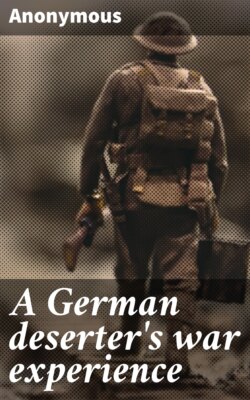A German deserter's war experience

Реклама. ООО «ЛитРес», ИНН: 7719571260.
Оглавление
Anonymous. A German deserter's war experience
A German deserter's war experience
Table of Contents
I MARCHING INTO BELGIUM
II FIGHTING IN BELGIUM
III SHOOTING CIVILIANS IN BELGIUM
IV GERMAN SOLDIERS AND BELGIAN CIVILIANS
V THE HORRORS OF STREET FIGHTING
VI CROSSING THE MEUSE
VII IN PURSUIT
VIII NEARLY BURIED ALIVE ON THE BATTLEFIELD
IX SOLDIERS SHOOTING THEIR OWN OFFICERS
X SACKING SUIPPES
XI MARCHING TO THE BATTLE OF THE MARNE—INTO THE TRAP
FOOTNOTE:
XII AT THE MARNE—IN THE MAW OF DEATH
XIII THE ROUT OF THE MARNE
XIV THE FLIGHT FROM THE MARNE
XV AT THE END OF THE FLIGHT
XVI THE BEGINNING OF TRENCH WARFARE
XVII FRIENDLY RELATIONS WITH THE ENEMY
XVIII FIGHTING IN THE ARGONNES
XIX CHRISTMAS IN THE TRENCHES
XX THE "ITCH"—A SAVIOR
XXI IN THE HELL OF VAUQUOIS
XXII SENT ON FURLOUGH
XXIII THE FLIGHT TO HOLLAND
XXIV AMERICA AND SAFETY
Отрывок из книги
Anonymous
Published by Good Press, 2019
.....
On the 21st of August we came in contact with the first German troops belonging to the Fourth Army, about 15 miles to the east of the Belgian town of Neufchateau. The battle of Neufchateau, which lasted from the 22nd to the 24th of August, had already begun. A French army here met with the Fourth German Army, and a murderous slaughter began. As is always the case it commenced with small skirmishes of advance guards and patrols; little after little ever-growing masses of soldiers took part and when, in the evening of the 22nd of August, we were led into the firing line, the battle had already developed to one of the most murderous of the world war. When we arrived the French were still in possession of nearly three-quarters of the town. The artillery had set fire to the greatest part of Neufchateau, and only the splendid villas in the western part of the town escaped destruction for the time being. The street fighting lasted the whole night. It was only towards noon of the 23rd of August, when the town was in the hands of the Germans, that one could see the enormous losses that both sides had suffered. The dwelling-places, the cellars, the roads and side-walks were thickly covered with dead and horribly wounded soldiers; the houses were ruins, gutted, empty shells in which scarcely anything of real value had remained whole. Thousands had been made beggars in a night full of horrors. Women and children, soldiers and citizens were lying just where death had struck them down, mixed together just as the merciless shrapnel and shells had sent them out of life into the darkness beyond. There had been real impartiality. There lay a German soldier next to a white-haired French woman, a little Belgian stripling whom fear had driven out of the house into the street, lay huddled up against the "enemy," a German soldier, who might have been protection and safety for him.
Had we not been shooting and stabbing, murdering and clubbing as much and as vigorously as we could the whole night? And yet there was scarcely one amongst us who did not shed tears of grief and emotion at the spectacles presenting themselves. There was for instance a man whose age it was difficult to discover; he was lying dead before a burning house. Both his legs had been burnt up to the knees by the fire falling down upon him. The wife and daughter of the dead man were clinging to him, and were sobbing so piteously that one simply could not bear it. Many, many of the dead had been burnt entirely or partly; the cattle were burning in their stables, and the wild bellowing of those animals fighting against death by fire, intermingled with the crying, the moaning, the groaning and the shrieking of the wounded. But who had the time now to bother about that? Everybody wanted help, everybody wanted to help himself, everybody was only thinking of himself and his little bit of life. "He who falls remains where he lies; only he who stands can win victories." That one learns from militarism and the average soldier acts upon that principle. And yet most soldiers are forced by circumstances to play the rôle of the good Samaritan. People who could formerly not look upon blood or a dead person, were now bandaging their comrades' arms and legs which had been amputated by shells. They did not do it because they were impelled by the command of their heart, but because they said to themselves that perhaps to-morrow already their turn might come and that they, too, might want assistance. It is a healthy egotism which makes men of mercy out of those hardened people.
.....